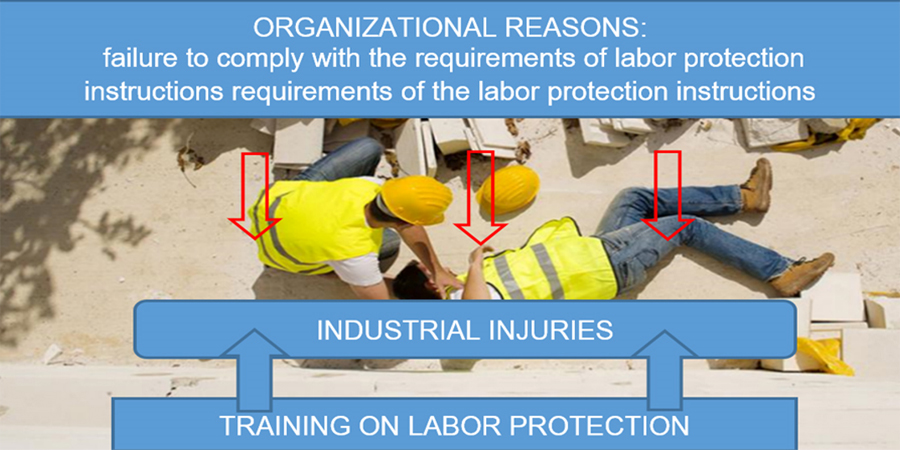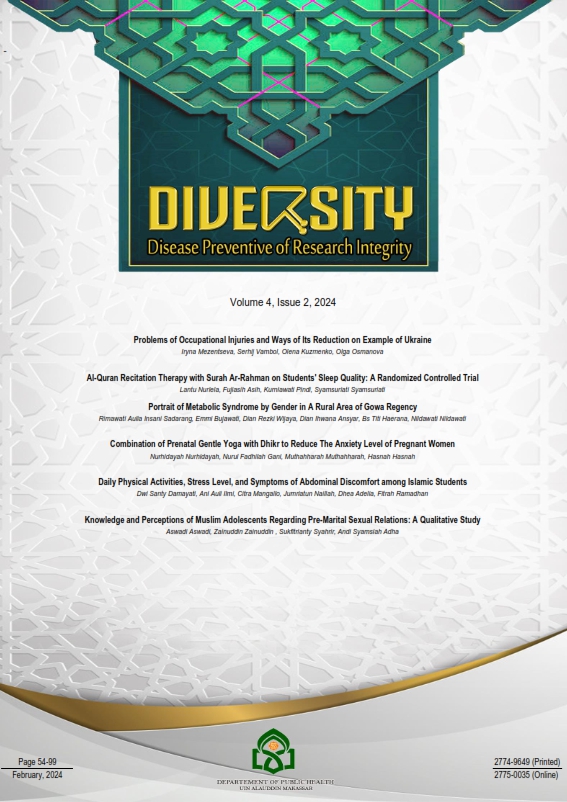Problems of Occupational Injuries and Ways of Its Reduction on Example of Ukraine
Abstract
Manuscript presents a study of the causes of accidents on the example of Ukraine in recent years, considering the peculiarities of the modern period. The relevance of this study is due to the high level of industrial injuries in Ukraine compared to the industrialized countries of the European Union. Data on the dynamics of the causes of accidents for the period from 2015 to 2022 are presented. Data for the study were taken from open sources of information. The most trauma-dangerous industries of the national economy are considered. Proposed measures to reduce the level of injury in Ukraine. The analysis of the obtained results showed a certain dependence of the causes of accidents on the coronavirus infection. An unchanging leading position in the organizational causes of accidents has been established. According to the results of the study, regularities were established regarding the most traumatic sectors of the economy in the presented years. The predominance of organizational causes of industrial injuries due to the low motivational component of occupational safety is shown. The need to improve training on occupational health and safety issues for employees at all levels was noted. It was established that the reduction of industrial injuries is impossible without the teaching of labor protection issues in institutions of higher education by future heads of structural divisions and leading specialists. Mandatory review and re-approval of the instructions, the violation of which led to an accident, is proposed. It is recommended to apply mandatory professional selection and more thorough control over periodic preventive medical examinations.

Downloads
References
Baharuddin, A., Fachrin, S. A., & Putri , W. E. (2023). Behavior Based Safety Implementation Using the DO IT Method at Pertamina in Makassar City. Diversity: Disease Preventive of Research Integrity, 4(1), 131-137. https://doi.org/10.24252/diversity.v4i1.40918
Berezovskyi, A. P., Trus, O. M., & Prokopenko, E. V. (2021). Analysis of the state of industrial traumatism by regions of ukraine. Scientific Progress & Innovations, (3), 249-257. https://doi.org/10.31210/visnyk2021.03.31
Cabinet of Ukraine Ministers (2011). NPAOP 0.00-6.02-11 The procedure for investigating and keeping records of accidents, occupational diseases and accidents at work. https://dnaop.com/html/56626/doc-НПАОП_0.00-6.02-11
Cabinet of Ukraine Ministers. (2019). The procedure for investigating and recording accidents, occupational diseases and accidents at work. https://zakon.rada.gov.ua/laws/show/337-2019-п#Text
Cabinet of Ukraine Ministers. (2023). On amendments to the Procedure for investigating and recording accidents, occupational diseases and accidents at work. https://zakon.rada.gov.ua/laws/show/59-2023-п#Text
Didur, К. М., & Dmitryuk, S. (2023). Economic Consequences Of Working Injuries. Agrosvit, 9–10, 96–105. https://doi.org/10.32702/2306-6792.2023.9-10.96
Dushko, T. (2020). Occupational health and safety in Ukraine and abroad: health and occupational safety management system. https://oppb.com.ua/articles/ohorona-praci-v-ukrayini-ta-za-kordonom-systema-menedzhmentu-ohorony-zdorovya-ta
El-Menyar, A., Mekkodathi, A., & Al-Thani, H. (2016). Occupational injuries: Global and local perspectives. Nepal journal of epidemiology, 6(2), 560. https://doi.org/10.3126/nje.v6i2.1516
European Commission. (2023). Employment, Social Affairs, & Inclusion. https://ec.europa.eu/social/main.jsp?catId=864&langId=en
Hunegnaw, B., Molla, M., Mulugeta, Y., & Meseret, M. (2021). Assessment of occupational injury among industrial workers in the Bahir Dar city of northwest Ethiopia: institution-based cross-sectional study. Journal of environmental and public health, 2021. https://doi.org/10.1155/2021/2793053
Kostikov, V. H. (2021). The issue of occupational safety at the master's level of education in various higher educational institutions. Human safety in modern conditions : coll. of 13th Intern. Sci. and Methodological Conf., 147 Intern. Sci. Conf. of the Europ. Assoc. for Security (EAS). (pp. 38-40). Kharkiv. https://repository.kpi.kharkov.ua/handle/KhPI-Press/58532
Kruzhilko, O., Polukarov, O., Vambol, S., Vambol, V., Khan, N. A., Maystrenko, V., & Khan, A. H. (2020). Control of the workplace environment by physical factors and SMART monitoring. Archives of Materials Science and Engineering, 103(1). https://doi.org/10.5604/01.3001.0014.1770
Mezentsev, S. M. (2023). The key to future life is job security. Future Healthcare: Innovations, Advances and Progress : proc. of the 2nd Intern. Sci. and Practical Internet Conf, (pp. 105-107). https://repository.kpi.kharkov.ua/handle/KhPI-Press/66492
Mezentseva, I. O. (2020). Development of safety rules in case of COVID-19 for workers in production. Bezpeka liudyny u suchasnykh umovakh : zb. tez nauk. dop. 12-yi mizhnar. nauk.-metod. konf. ta 144-yi Mizhnar. konf. Yevrop. Asots. nauk z bezpeky (EAS). https://repository.kpi.kharkov.ua/handle/KhPI-Press/49622
Mezentseva, I. O. (2023). Technogenic, natural, environmental and social causes of industrial injuries. Tekhnichnyi prohres v APV : materialy Vseukr. nauk.-prakt. konf., (pp. 159-162). https://repository.kpi.kharkov.ua/handle/KhPI-Press/65426
Nipialidi, O. Y., & Vasylchyshyn, O. B. (2020). The current state of labor protection in Ukraine in the context of ensuring its innovative development. Aktualni problemy pravoznavstva [Current issues of jurisprudence], 1, 164-169. https://doi.org/10.35774/app2020.01.164
Ragimov, S., Sobyna, V., Vambol, S., Vambol, V., Zakora, A., Strejekurov, E., & Shalomov, V. (2018). Physical modelling of changes in the energy impact on a worker taking into account high-temperature radiation. Journal of Achievements in Materials and Manufacturing Engineering, 27-33. https://doi.org/10.5604/01.3001.0012.965
Ruslan, K., Inshyn, M., Dmytro, S., Yelena, T., & Olena, A. (2020). Occupational safety and health of factory workers in European countries in the nineteenth century: historical and legal analysis. Labor History, 61(3–4), 388–400. https://doi.org/10.1080/0023656x.2020.1775796
Sharma, R., Rahman, K. A., Tyshchenko, V., Illiash, O., & Mezentseva, I. (2023). Analysis of a City's Heat Island Effect on the Micro-Climate Parameters within Cities. Proceedings of the Pakistan Academy of Sciences: A. Physical and Computational Sciences, 60(2), 7-16. https://doi.org/10.53560/PPASA(60-2)827
Social Insurance Fund of Ukraine. (2023). Industrial Injuries in Ukraine. from http://www.fssu.gov.ua/fse/control/main/uk/index
Tairova, T. M., Romanenko, N. V., & Slipachuk, O. A. (2020). Pidvyshchennia rezultatyvnosti zakhodiv iz zapobihannia vyrobnychomu travmatyzmu na osnovi modeliuvannia systemy okhorony pratsi v mashynobuduvanni. Problemy okhorony pratsi v Ukraini, 36(4), 23-29. https://doi.org/10.36804/nndipbop.36-3.2020.23-29
The State of Industrial Injuries. (2023). Derzhavna sluzhba Ukrainy z pytan pratsi. https://dsp.gov.ua/stanvyrobnychoho-travmatyzmu
Vambol, S. O. (2021). Znachennia vyshchoi profesiinoi osvity dlia znyzhennia ryzyku vyrobnychoho travmatyzmu (The importance of higher professional education for reducing the risk of occupational injuries). Inzheneriia pryrodokorystuvannia., 120–132. https://repo.btu.kharkov.ua//handle/123456789/1007
Zygmunt, L. S. (2020). Suchasnyi stan okhorony pratsi v Ukraini ta za kordonom (The current state of labor protection in Ukraine and abroad). https://zolochiv.net/suchasnyy-stan-okhorony-pratsi-v-ukraini-ta-za-kordonom
Copyright (c) 2024 Iryna Mezentseva, Serhij Vambol, Olena Kuzmenko, Olga Osmanova

This work is licensed under a Creative Commons Attribution-NonCommercial-ShareAlike 4.0 International License.
Authors retain copyright and grant the journal right of first publication with the work simultaneously licensed under a Creative Commons Attribution-NonCommercial-ShareAlike 4.0 International License that allows others to share the work with an acknowledgment of the work's authorship and initial publication in this journal.
Authors are able to enter into separate, additional contractual arrangements for the non-exclusive distribution of the journal's published version of the work (e.g., post it to an institutional repository or publish it in a book), with an acknowledgment of its initial publication in this journal.
Authors are permitted to publish their work online in third parties as it can lead to wider dissemination of the work.




